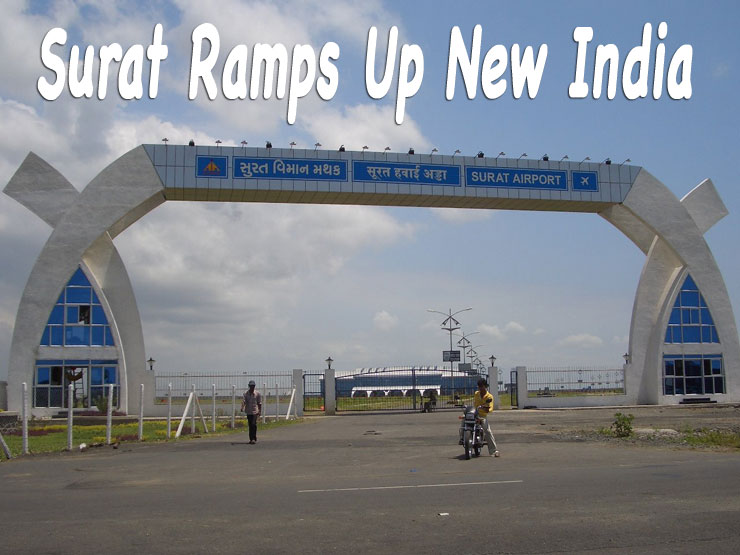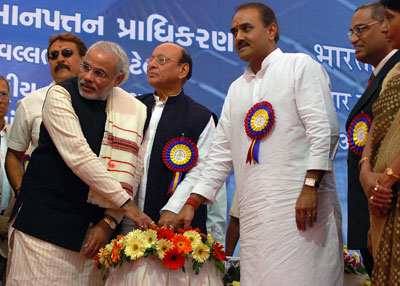 The
entrance to Surat Airport The
entrance to Surat Airport
 Gujarat
Chief Minister Narendra Modi and Civil Aviation Praful Patel at the inauguration
of the new terminal at Ahmedabad International Airport early this year. Gujarat
Chief Minister Narendra Modi and Civil Aviation Praful Patel at the inauguration
of the new terminal at Ahmedabad International Airport early this year.
Surat, the diamond capital of the world and the commercial capital of
the state of Gujarat in India, will be able to get its cargo hub in the
near future. Through its secretary, D. S. Rawat, the Associated Chamber
of Commerce (ASSOCHAM), the apex body with more than 300 Chambers and
Trade Associations, has sent out a request to Civil Aviation Minister,
Praful Patel, and the state’s Chief Minister, Narendra Modi, to
upgrade the existing airport in the city and set up a cargo hub.
The immediate reason for the request is
the large-scale investment the city has seen over the last year. In 2008-09,
6,645 industrial units were registered in the city. ASSOCHAM forecast
that over the next few years, investments would rise, leading to jobs
for more than 50,000 persons. The South Gujarat Chamber of Commerce and
Industry has made a similar demand for a cargo hub in Surat.
Surat is well known for its textile
and diamond businesses. In fact, the city polishes 9 out of every 11 diamonds
in the world. The rough stones come to the city for polishing, after which
they are exported. The April-February 2010 figures show that the export
of cut and polished diamonds from the city had gone up by 20 percent over
the same period in 2009. In the near future, the volume of diamond exports
will certainly go up, primarily due to a recent move by the newly formed
Surat Diamond Sourcing India Ltd (SDSIL), which could see more rough stones
coming to the city’s 4,500-odd polishing units. In addition, Surat’s
textile hub produces 40 percent of world-class manmade fabrics in India
and exports 18 percent of it. Despite these high figures, the city lacks
proper air connectivity with the rest of the country. Today, it is only
linked to three destinations: Delhi,
Jaipur and Gujarat’s capital, Ahmedabad; hence the request from
ASSOCHAM.
While the ASSOCHAM secretary pointed
out in his letter that "besides being the diamond capital of the
world, Surat could also become hub for textiles, trade, intricate zari
(silver embroidery) works, chemical industries, engineering, logistics
and petrochemicals,” the South Gujarat Chamber of Commerce and Industry
recently met some of the leading domestic carriers of the country to ask
them to start more flights to and from the city. On its part, the Airports
Authority of India (AAI), which manages the airport, sent two of its officials
on a survey to find out whether the airport could be upgraded and a cargo
hub set up.
Tirthankar Ghosh
|




